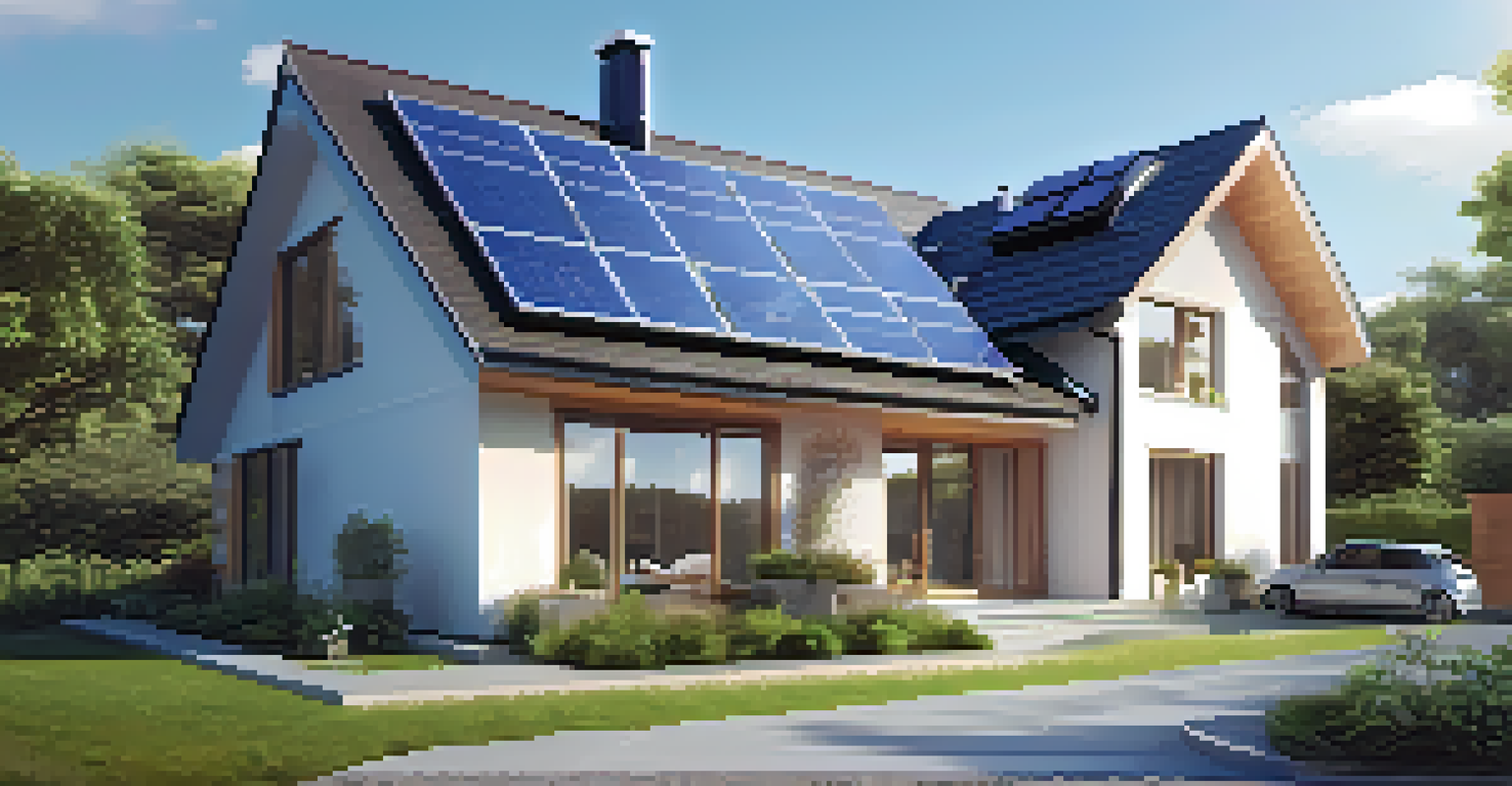Best Practices for Sustainable Property Management

Understanding Sustainable Property Management Essentials
Sustainable property management is all about balancing environmental responsibility with economic viability. It involves strategies that not only preserve the planet but also enhance the property’s value over time. Think of it like nurturing a garden—when you take care of the soil (environment), the plants (property) thrive.
The greatest threat to our planet is the belief that someone else will save it.
One of the key aspects of sustainable property management is energy efficiency. This can include anything from upgrading insulation to installing smart thermostats. By reducing energy consumption, not only do you help the environment, but you also cut costs, creating a win-win situation for property owners and tenants alike.
Lastly, it’s about community engagement. Sustainable property management fosters a sense of community and encourages practices like recycling and conservation among residents. Imagine living in a neighborhood where everyone is committed to sustainability; it creates a more harmonious and responsible living environment.
Implementing Energy-Efficient Solutions in Properties
One of the easiest ways to make a property more sustainable is by investing in energy-efficient solutions. This can include installing LED lighting, energy-efficient appliances, or even solar panels. Picture a home where the lights automatically dim when not in use; it’s not just smart, it’s sustainable.

Additionally, regular energy audits can help identify areas where energy is wasted. These audits act like a health check-up for your property, revealing opportunities for improvement. Simple changes, such as sealing leaks or upgrading windows, can lead to significant energy savings.
Embrace Energy Efficiency
Investing in energy-efficient solutions not only reduces costs but also minimizes environmental impact.
Moreover, incorporating renewable energy sources can enhance the sustainability of your property. Whether it’s solar panels or wind turbines, these investments not only reduce your carbon footprint but can also attract eco-conscious tenants who value sustainability.
Water Conservation Techniques for Property Management
Water conservation is a critical component of sustainable property management. Simple techniques like installing low-flow faucets and toilets can drastically reduce water usage. Imagine saving money on water bills while still enjoying a comfortable living environment; it’s a practical approach to sustainability.
Sustainability is not just about what we do, but how we think about the world around us.
Rainwater harvesting is another innovative method to consider. By collecting rainwater for irrigation or flushing toilets, properties can significantly lower their water consumption. This practice not only conserves water but also reduces strain on local water resources.
Lastly, educating tenants about water conservation practices is essential. Providing information on how they can contribute—like reporting leaks or being mindful of water usage—creates a culture of sustainability within the community.
Sustainable Landscaping Practices for Property Owners
Sustainable landscaping goes hand-in-hand with property management. Choosing native plants that require less water and maintenance helps create a more sustainable outdoor environment. Think of it as a way to make your property beautiful while being kind to the ecosystem.
Incorporating xeriscaping techniques can also minimize water usage. This practice focuses on landscaping that reduces or eliminates the need for irrigation. Imagine a vibrant garden that flourishes without constant watering; it’s not only feasible, but it’s also environmentally friendly.
Foster Community Engagement
Encouraging tenant participation in sustainability initiatives creates a shared responsibility and strengthens community ties.
Moreover, using organic fertilizers and pesticides can enhance the health of your landscape. By avoiding harmful chemicals, you protect local wildlife and promote a healthier ecosystem. This approach not only benefits the environment but also adds value to your property.
Waste Management Strategies for Sustainable Properties
Implementing effective waste management strategies is crucial for sustainable property management. Encouraging recycling and composting can significantly reduce waste sent to landfills. Picture a community where waste is minimized and resources are reused; that’s the goal of sustainable waste management.
Providing accessible recycling stations and clear guidelines can motivate tenants to participate. When residents see that their efforts matter, they are more likely to embrace these practices. It’s about making sustainability a shared responsibility within the community.
Additionally, partnering with local waste management services can enhance these efforts. Together, you can create programs that educate residents on proper waste disposal and recycling practices. This collaboration leads to a more engaged and environmentally conscious community.
The Role of Technology in Sustainable Property Management
Technology plays a pivotal role in enhancing sustainable property management practices. Smart home technology, like programmable thermostats and energy monitoring systems, helps property owners manage energy consumption efficiently. Imagine being able to control your heating and cooling remotely; it’s not just convenient, it’s sustainable.
Moreover, property management software can streamline operations and improve communication with tenants. By utilizing these tools, property managers can efficiently track maintenance requests, energy usage, and sustainability efforts. This transparency fosters a more engaged community and enhances overall property management.
Utilize Technology for Sustainability
Leveraging technology, such as smart home systems and data analytics, enhances property management efficiency and sustainability.
Additionally, data analytics can provide valuable insights into energy usage patterns and areas for improvement. By analyzing this data, property managers can make informed decisions that enhance sustainability. It’s all about leveraging technology to create a more efficient and responsible property management approach.
Educating Tenants on Sustainable Practices
Educating tenants about sustainable practices is essential for effective property management. Providing resources like workshops, newsletters, or even simple flyers can raise awareness about sustainability initiatives. Think of it as building a community of eco-conscious residents who are eager to contribute.
Offering incentives for sustainable behaviors, such as discounts on rent for recycling or conserving energy, can motivate tenants to participate. Imagine a community where everyone is rewarded for making environmentally friendly choices; it creates a positive atmosphere.

Lastly, creating a feedback loop where tenants can share their thoughts on sustainability initiatives helps build a sense of ownership. When residents feel heard and valued, they are more likely to engage in sustainable practices. It’s about fostering a collaborative environment where everyone works towards a common goal.
Measuring Success in Sustainable Property Management
Measuring success in sustainable property management involves tracking various metrics related to energy usage, waste reduction, and tenant engagement. By establishing benchmarks and regularly assessing performance, property managers can identify areas for improvement. It’s like setting goals in a fitness journey; tracking progress helps keep you motivated.
Utilizing tools like energy management systems can provide real-time data on consumption patterns. This information can guide decision-making and highlight the impact of sustainability initiatives. When you can see the tangible results of your efforts, it encourages continued commitment to sustainable practices.
Finally, celebrating achievements and sharing success stories with tenants can inspire further participation. Recognizing milestones, whether big or small, fosters a culture of sustainability in the community. It’s about creating an environment where everyone feels proud of their contributions to a greener future.